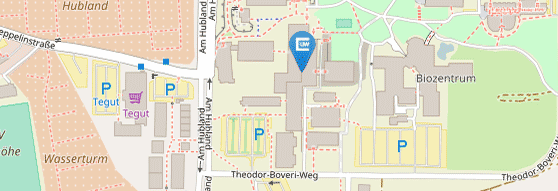Developments in Boron Chemistry: from Fundamental Studies to Applications
Organization: Jun.-Prof. Dr. Agnieszka Nowak-Król (JMU Würzburg, Institute of Inorganic Chemistry and Institute for Sustainable Chemistry & Catalysis with
Boron)
Prof. Dr. Dr. h. c. Todd Marder (JMU Würzburg, Institute of Inorganic Chemistry and Institute for Sustainable Chemistry & Catalysis with Boron)
Rachel Steinhaus (JMU Würzburg, Faculty of Chemistry and Pharmacy)
Dates: Sept. 27th - Oct. 1st, 2021
Lectures will be held between 9 AM and 12 PM Central European Time to accomodate students in as many time zones as possible.
Application Deadline: April 1, 2021
Place: Webinar by the Institute of Inorganic Chemistry and Institute for Sustainable Chemistry & Catalysis with Boron of the JMU Würzburg
Level: Students at the master level as well as PhD students and postdocs are encouraged to apply. Students can receive a participation certificate upon completion of the course with a list of the total work load and competencies. Please check with your home institution if this can be recognized for credit.
Course Description:
The chemistry of boron compounds has experienced rapid progress. This is due to impressive developments in synthetic methodologies, which have made accessible even exotic chemical scaffolds while also expanding the role of boron compounds in a wide variety of coupling reactions and functional group transformations. Their wider molecular scope and commercial availability, including bulk quantities, has enhanced the importance of boron-containing compounds in biology and materials science.
The Virtual Chemistry Course is an excellent opportunity to introduce students to new concepts and directions in boron chemistry. The lectures will give an overview of recent developments in the field. The focus will be put on the relevant classes of boron compounds, synthetic methods to access boron-containing scaffolds, their properties, applications of boron compounds in catalysis, and properties that arise from embedding boron into pi-conjugated scaffolds along with applications of boron-containing compounds in organic electronics and bioimaging. The talks will also provide insight into spectroscopic and theoretical tools to study selected classes of these fascinating compounds.
Focus and Topics: - Transition-metal-catalyzed borylation of C-H and C-X Bonds - synthesis of aryl and alkyl boronates - Lewis-acid/Lewis-base adducts of diborane(4) compounds - Weakly coordinating anions and ionic liquids - Diborenes and diborynes - Borylenes - Three-coordinate boron compounds – synthesis, optical properties and cell imaging - Pi-conjugated four-coordinate boron compounds – properties and applications in organic electronics - Helically chiral boron compounds – synthesis, chirality, structural and optical properties - Boron-containing inorganic-organic hybrid materials: a) Organoboron polymers, b) Molecular materials - Spectroscopic studies of reactive boron compounds - Theoretical description of boron containing compounds – fundamental aspects - Modern computational approaches to investigate the chemistry of reactive boron species
Lectures will be held by the following speakers of the JMU Würzburg:
Prof. Dr. Holger Braunschweig, Institute of Inorganic Chemistry and Institute for Sustainable Chemistry & Catalysis with Boron Prof. Dr. Bernd Engels, Institute of Physical and Theoretical Chemistry Dr. Felipe Fantuzzi, Institute of Inorganic Chemistry Prof. Dr. Maik Finze, Institute of Inorganic Chemistry and Institute for Sustainable Chemistry & Catalysis with Boron Prof. Dr. Ingo Fischer, Institute of Physical and Theoretical Chemistry Prof. Dr. Holger Helten, Institute of Inorganic Chemistry Prof. Dr. Dr. h. c. Todd Marder, Institute of Inorganic Chemistry and Institute for Sustainable Chemistry & Catalysis with Boron Jun.-Prof. Dr. Agnieszka Nowak-Król, Institute of Inorganic Chemistry and Institute for Sustainable Chemistry & Catalysis with Boron Prof. Dr. Udo Radius, Institute of Inorganic Chemistry Relevant reviews on catalytic borylation and diboron compounds:
Y.-M. Tian, X.-N. Guo, H. Braunschweig, U. Radius, and T.B. Marder, Photoinduced Borylation for the Synthesis of Organoboron Compounds Chem. Rev. (2021). DOI: 10.1021/acs.chemrev.0c01236 Y.P. Budiman, S.A. Westcott, U. Radius, and T.B. Marder, Fluorinated Aryl Boronates as Building Blocks in Organic Synthesis Adv. Synth. Catal., (2021). DOI: 10.1002/adsc.202001291 E.C. Neeve, S.J. Geier, I.A.I. Mkhalid, S.A. Westcott, and T.B. Marder Diboron(4) Compounds: From Structural Curiosity to Synthetic Workhorse Chem. Rev., 116, 9091-9161 (2016). DOI: 10.1021/acs.chemrev.6b00193 S. Würtemberger-Pietsch, U. Radius, and T.B. Marder 25 Years of N-Heterocyclic Carbenes: Activation of Both Main-Group Element-Element Bonds and NHCs Themselves Dalton Trans., 45, 5880-5895 (2016). DOI: 10.1039/C5DT04106F R.D. Dewhurst, E.C. Neeve, H. Braunschweig, and T.B. Marder sp2-sp3 Diboranes: Astounding Structural Variability and Mild Sources of Nucleophilic Boron for Organic Synthesis Chem. Commun., 51, 9594-9607 (2015) DOI: 10.1039/c5cc02316e Relevant reviews on boron materials:
S.M. Berger, M. Ferger, and T.B. Marder Synthetic Approaches to Triarylboranes from 1885 to 2020 Chem. Eur. J., (2021). DOI: 10.1002/chem.202005302 J. He, F. Rauch, M. Finze, and T.B. Marder (Hetero)Arene-Fused Boroles: A Broad Spectrum of Applications Chem. Sci., 12, 128-147 (2021). DOI: 10.1039/d0sc05676f L. Ji, S. Griesbeck, and T.B. Marder Recent Developments in and Perspectives on Three-Coordinate Boron Materials: A Bright Future Chem. Sci., 8, 846-863 (2017). DOI: 10.1039/C6SC04245G.
Click here for the full course schedule.
All students will be offered a scholarship which covers the full cost of participation in this course. Please return your signed Declaration of Acceptance of Scholarship form as part of your application to confirm your scholarship. The scholarship will be directly applied to your participation fees - you will not receive a bill nor the scholarship funds.
Plesae note the English version of the Declaration of Accpetance of Scholarship is intended solely as a convenience to non-German-reading applicants. Any discrepancies or differences that may arise in the translation of the German version are not legally binding.
The application deadline for this Virtual Chemistry Course has passed.

